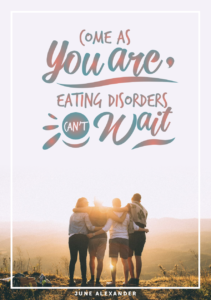The decline over time: why eating disorders can’t afford to wait

The decline over time: why eating disorders can’t afford to wait
Your story counts: Rachel Egan (UK) shares her personal experience in addressing the World Eating Disorders Action Day theme “Eating Disorders: We Can’t Afford to Wait”.
We know that speedy access to eating disorder treatment offers the best chance of a full and long-lasting recovery. We know an eating disorder has a devastating effect on a person’s physical and mental health, and spreads destruction onto the family and friends as well. Why then are people with eating disorders in the UK waiting up to five years for treatment on the NHS?
I know what it feels like to wait a long time for treatment. How worthless and unimportant you feel as the months go by while you languish on a waiting list somewhere. Phone calls and letters to the service go unreturned, and all the time you are sinking deeper and deeper into the eating disorder.
I was first diagnosed with anorexia at the age of 15. I was in a noisy, chaotic Accident and Emergency waiting room with my parents. Things had reached crisis point. I was having heart palpitations, chest pains and experiencing dizzy spells and black spots in my vision. Luckily I didn’t have to wait long in that waiting room; within about 2.5 hours I was admitted to hospital and commenced treatment with a multi-disciplinary team within a week of being discharged. While this sounds good, I had to wait six months to reach this point.
The cost of making decisions with BMI readings
Services continue to adopt this approach today: you have to be physically very, very sick to get speedy access to treatment and even then it isn’t guaranteed that you won’t have to wait. This is a very ineffective and risky approach to treatment, because a lower BMI at the start of treatment is associated with poorer recovery outcomes.
Many people with eating disorders are refused referrals to specialist ED services on the grounds that their BMI is ‘too high’. They are basically left to go home and lose more weight, become critically underweight and then struggle through a treatment program which would have been far more effective if offered when help was first sought. Others don’t receive any treatment at all, as many services continue to fail to recognise that eating disorders can affect people of any weight or shape.
The cost of waiting – the illness feeds on it
Most recently, I was referred to an Adult Outpatient Eating Disorders service in early October 2017. I waited over a year to start treatment and didn’t have my first appointment until 30th November 2018. My time on the waiting list was frustrating, lonely and my symptoms got worse and became more engrained. Eating disorders are insidious and they can creep back into your life without warning. They can change shape and while restriction might have been a primary behaviour initially, you’re the eating disorder may morph into a problem with excessive exercise, binge-eating or taking diet pills thereafter. As such, an eating disorder can be chronic and require multiple attempts at recovery; meaning that you may need more than one round of treatment to overcome it. I didn’t expect to find myself in this situation in 2017, but I did.
The cost of lack of training — for medical practitioners
My referral to the ED service didn’t even come through the traditional route: despite my low weight and my history of anorexia, my GP did not pick up on my eating disorder. It’s unsurprising really, when you consider how, in the UK, only one out of 21 compulsory modules for trainee GPs is focussed on mental health and less than half of trainee GPs complete a placement in a mental health setting.
Instead my referral came via the IAPT (Improving Access to Psychological Therapies) service. I had been referred to IAPT after experiencing persistent low mood and anxiety and had a telephone consultation with them. They decided that I would be better placed with an eating disorder service on the basis of my behaviours and low weight and made the referral which was quickly approved by my doctor. When I phoned the service to ensure that they had received it, they said yes and that I would be assessed within two-three months. Six months went by and I had heard nothing, I had tried calling but my calls were frequently ignored or not returned. When I eventually did get assessed, my mood was the lowest it had been in a long time, and during the assessment I was told that I now had to wait another six months wait for treatment to begin. To wait six months for assessment, only to be told that you have another six month wait to start treatment is demoralising. I wasn’t offered any information or support on where to go for help during that time; I wasn’t even signposted to the UK eating disorders charity Beat. I went home feeling overwhelmed and despondent.
The cost of waiting – on health and hope
I wish it was only six months. Instead I waited eight months after my assessment to begin treatment. Not once did the service call me or my GP during this time to see how I was. Instead I felt they were stringing me along, constantly promising I would be seen the next month and then nothing when that month came. When I finally started treatment at the end of November 2018 I was exhausted, more underweight and had great difficulty in trusting these people who had left me adrift with my anorexia for over a year. This was a poor foundation on which to start my recovery.
People with eating disorders deserve better than this. Eating disorders cannot afford to wait. They have an increased risk of suicide, they disrupt social functioning and they can lead to a number of long-lasting physical and mental health issues. We need strong governmental action to ensure that maximum waiting times in both Adult and Child/Adolescent eating disorders services are adhered to so that people with eating disorders have the best chance possible of making a full recovery.
For information and support on eating disorders in the UK visit:
Beat: https://www.beateatingdisorders.org.uk/
About World Eating Disorders Action Day 2019
This year grassroots activists, volunteers, and over 250 organizations in 40+ countries are calling for caregivers to receive support, health care workers to be properly trained, and access to immediate, evidence-based treatment.
Why We Can’t Afford to Wait
- Worldwide over 70 million people are estimated to be affected by an eating disorder,
- Eating disorders have the HIGHEST MORTALITY RATE of any psychiatric illness
- Eating disorders affect people of all genders, sexual orientations, ages, socioeconomic class, abilities, races, and ethnic backgrounds. It is time to take action.
- Good news! When treated EARLY and correctly, eating disorders have the highest and fastest recovery rate!
How to support World Eating Disorders Action Day, June 2, 2019
- Join the movement, show your purple on social media! Use hashtag #ShowUsYourPurple
- Follow conversation on social media. Use hashtags #ShowUsYourPurple #WeDoActNow
- Host or attend an event. See http://www.worldeatingdisordersday.org/2019-events-2/
- Donate. To support the work see http://www.worldeatingdisordersday.org/get-involved/participating-organisations/.
- Discuss eating disorders. Through open, supportive dialogue, we can create change.
E-book release: Come as you are, eating disorders can’t wait

As a Participating Organisation supporting 2019 World Eating Disorder Action Day, The Diary Healerhas released a new ebook, Come as you are, eating disorders can’t wait. Stories from around the world illustrate that recovery from an eating disorder IS possible, at every age. The first step, is to seek help. Click here to purchase a copy for $9.97 (AUD) – all profits support eating disorder services.
References
The Guardian, Nov 2017. https://www.theguardian.com/society/2017/nov/15/long-nhs-delays-can-be-devastating-for-patients-with-eating-disorders. Retrieved April 2019
Kawai, K., Yamashita, S., Komaki, G., Shimizu, M., Nakashima, M., Etou, S., … Sudo, N. (2014). The outcome of treatment for anorexia nervosa inpatients who required urgent hospitalization. BioPsychoSocial medicine, 8, 20. doi:10.1186/1751-0759-8-20
Happiful Magazine, June 2018. https://happiful.com/survey-reveals-40-of-gp-appointments-about-mental-health/. Retrieved April 2019
Mind website. https://www.mind.org.uk/news-campaigns/campaigns/you-and-your-gp/gp-training-data/ Retrieved April 2019





